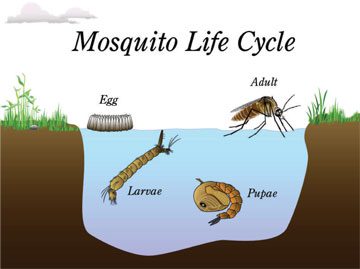We were at my parent’s house for Easter and the breezeway was full of huge mosquitoes that came into the house every time one of my nephews left the door open a little longer than necessary. I didn’t think I’d have to be swatting mosquitoes in March! These bothersome pests can make an extremely early appearance and hang around late into the cold season.
think I’d have to be swatting mosquitoes in March! These bothersome pests can make an extremely early appearance and hang around late into the cold season.
Mosquitoes serve as vectors for a whole host of diseases, transferring infection from one human to another or one animal to another. From the more recent Zika virus to malaria and West Nile, these bugs need to be protected against. When it comes to our pets, heartworm is one of the major diseases that mosquitoes transmit.
Mosquitoes start out life as most bugs do, in egg form, progressing to larvae, pupa and then finally into their adult form. Eggs are laid in “rafts” in water or in soil that will become flooded or wet. They typically stay in egg form for only 48 hours! Some mosquitoes can remain dormant in cold or sub-zero temperatures throughout the winter and hatch when the weather warms up.
In larva form mosquitoes continue to grow and shed (four times) in water. They eat organic material and micro-organisms. After the fourth shedding they become pupa. Mosquitoes then cocoon and emerge shortly after into their adult form.
There are many convenient and easy options to protect your pet from heartworm. Next week we will be posting on various heartworm prevention medications we use here at A2AH.
View this video on the Mosquito life cycle
Recent Posts
About Us
Ann Arbor Animal Hospital is a locally-owned animal hospital operating for over 90 years in Ann Arbor, MI.
